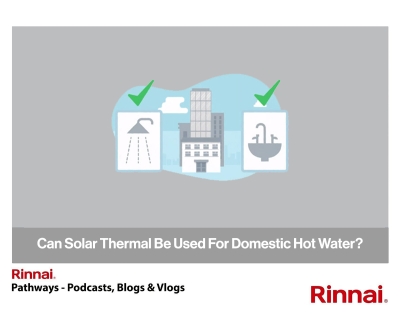Maximizing Efficiency and Savings with Solar Thermal Hot Water Systems
By harnessing the power of the sun, solar thermal systems can use solar panels or tubes to heat water, providing a continuous and reliable supply of domestic hot water for residential or commercial properties. Not only will they reduce the sites’ dependence on fossil fuels, but they can also reduce onsite operational expenditure.
Equipped with advanced technology, solar thermal hot water systems are designed to capture and store heat efficiently, ensuring that you always have access to hot water whenever you need it. Additionally, these systems are durable and require minimal maintenance. To study the features of the technologically advanced VirtuHot solar thermal systems visit https://www.rinnai-uk.co.uk/products/commercial/solar-collectors for more information.
How solar thermal hot water systems work.
Solar thermal hot water systems work by utilizing solar panels or tubes to capture and convert sunlight into heat energy. The system absorbs the energy from the UV exposure and transfers the heat into a fluid, typically water or a mixture of water and glycol.
The heated fluid then circulates through a series of pipes, transferring the heat to a storage tank. In a storage tank system, the hot fluid heats the water in the tank, which can then be used for various purposes, such as showers, washing dishes, or laundry.
For Rinnai Virtuhot schematics describing this process visit https://www.rinnai-uk.co.uk/application/files/2716/6333/2388/Rinnai_and_Virtu_HOT_-_How_does_it_work.png
To ensure continuous hot water supply, solar thermal hot water systems are often equipped with a backup heating source, such as an electric or gas heater. This backup system kicks in during periods of low sunlight or high hot water demand, ensuring that you always have access to hot water. The Rinnai water heater range perfectly complements solar thermal in these scenarios as the Rinnai system will only apply the precise amount of energy to boost the water temperature to the required set point.
Future trends and advancements in solar thermal technology
The future of solar thermal technology holds exciting possibilities. Researchers and engineers are continuously working on improving the efficiency and performance of solar thermal systems. Advancements in materials and design are expected to lead to more cost-effective and efficient solar collectors.
Innovations in thermal energy storage technologies will enable solar thermal systems to provide uninterrupted energy supply, even during extended periods without sunlight. Additionally, advancements in hybrid solar systems, combining solar thermal and solar PV technologies, could further enhance the overall efficiency and flexibility of solar energy generation.
We are pleased to be promoting one of the most cost effective and efficient systems on today’s marketplace with the VirtuHot solar thermal system key features include:
- Virtu saves up to 3.5x more carbon per m2 compared to conventional solar technology.
- Virtu delivers up to 50% greater financial returns per m2 in comparison to conventional solar technology.
- A design-led architecture and turnkey solution makes Virtu easy to install and keeps maintenance to a minimum.
- 10-year warranty
- Simple modular assembly
- Integrated mounting with self-ballasting: no need for roof penetration
- Compatible with any roof type
- Low profile: 26.5 cm installed height
For additional information or support visit https://www.rinnai-uk.co.uk/contact-us/help-me-choose-product
Solar thermal hot water system incentives and rebates
To encourage the adoption of solar thermal hot water systems, many governments and utility companies offer incentives and rebates. These programs aim to reduce the upfront costs and improve the return on investment for consumers.
Incentives and rebates can vary by location. Some common types of incentives include:
- Utility company programs: Many utility companies offer incentives or special rates for customers who install solar thermal hot water systems. These programs can include cash rebates, feed-in tariffs, or net metering arrangements, depending on the utility company and location.
- Green building certifications: Installing a solar thermal hot water system can contribute to achieving green building certifications, such as LEED (Leadership in Energy and Environmental Design) or BREEAM (Building Research Establishment Environmental Assessment Method). These certifications can provide additional benefits, such as increased property value and marketing opportunities.
Conclusion: Can solar thermal generate hot water?
The simple answer is yes - Solar thermal hot water systems offer a practical and sustainable solution for the hot water needs of many buildings and can create an economic and practical pathway to lower onsite carbon within existing and new build projects.
We recognise that air source heat pump design is not a straightforward task especially when designing commercial heat pump systems, so we aim to take the pain out of the process with our design support, capital expenditure, operational expenditure and carbon modelling for a free consultation with our heat pump experts contact us today on 0300 373 0660 or Help me choose a product :: Rinnai UK (rinnai-uk.co.uk)
Useful resources
Advice on installing solar water heating - Energy Saving Trust
